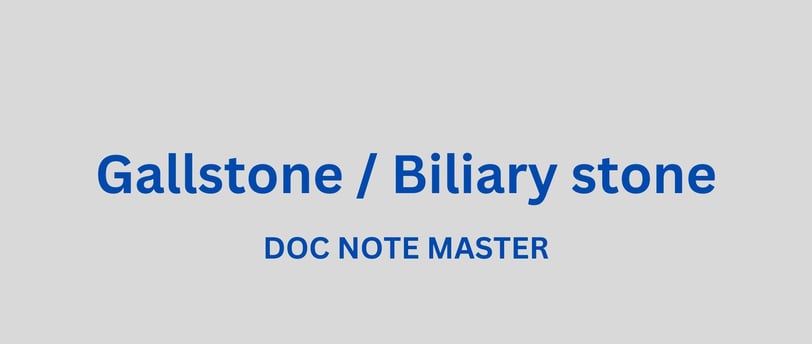online learning with Doc note master|| Himanshu paneru
GALLSTONE / BILLARY STONE/ CHOLELITHIASIS
Gallstones are small, hard particles that can form in the gallbladder.
HIMANSHU PANERU


Gallstone / Biliary stone
overview
Biliary stone commonly known as gallstone, are solid particles that form in the gallbladder.
Gall stone are hardened deposit of digestive fluid.
These stones can vary in size.
Gallstones arise due to an imbalance in the components of bile (digestive fluid produced by the liver).
Gallstones can be made of different substances, including cholesterol, bile salts, and bilirubin.
About gall-bladder:
Small, pear-shaped organ, located under the liver. Having important role in digestive system.
Gallbladder holds digestive fluid called bile that release in small intestine.
Causes
Primary cause of gall stone include:
Cholesterol imbalance:
Most common type of gallstone composed of cholesterol. When there is an imbalance in the substances that make up bile, particularly an excess of cholesterol it can lead to the formation of gallstones.
Bile Composition:
Bile is a digestive fluid produced by the liver & stored in the gallbladder. Changes in the composition of bile such as an increased concentration of cholesterol or decreased amounts of bile salts can contribute to gallstone formation.
Weight Loss:
Losing weight too quickly whether through dieting, surgery, or other reason can contribute to gallstone formation. This happen because rapid weight loss can lead to changes in bile composition.
Fasting or Prolonged Starvation: Going for long periods without eating or fasting can lead to changes in bile composition and contribute to gallstone formation.
RISK FACTOR
Risk factor for gallstone include:
Age:
Risk of gallstones increases with age, it is more common in individuals over the age of 40.
Gender:
In Women’s risk factor for developing gallstone is more than men. Due to hormonal changes during pregnancy or while taking birth control pills.
Family History:
If there is a family history of gallstones an individual is at a higher risk of developing them.
Weight Loss:
Rapid weight loss can change the balance of substances in bile which increase the risk of gallstone formation.
Diet:
Taking diet that consist high amount of fat & cholesterol or low amount of fiber can develop the chances of gallstone.
Pregnancy:
Women who are pregnant or have been pregnant are at an increased risk due to hormonal changes and increased pressure on the gallbladder.
Diabetes:
Type 2 diabetes patient are more chances of developing gallstones. This happen because of Insulin resistance in body.
SYMPTOMS
Common symptoms associated with gallstone include:
Abdominal pain
Nausea
Vomiting
Jaundice
Dark urine
Discomfort
Fever
DIAGNOSIS
Medical History and Exam:
Doctor asks for sign & symptoms to the patient in physical examination.
Blood Tests:
Blood (serum) sample is collected for diagnose the level liver enzyme & bilirubin levels, which can indicate gallbladder problem.
Increase level may indicate blockage of bile duct
Ultrasound:
First line imaging test for diagnosis gallstone.
Sound waves create images of the gallbladder to spot gallstones and assess its condition.
CT Scan:
Detailed X-ray images help identify gallstones and complications.
MRI:
Magnetic fields and radio waves create detailed images for assessing gallbladder and bile ducts.
Endoscopic Ultrasound:
Combines endoscopy with ultrasound to evaluate the gallbladder and bile ducts.
TREATMENT
Asymptomatic gallstones not require immediate treatment. In some cases docter’s may monitoring the patient for some duration.
Medications:
Ursodeoxycholic acid (UDCA) may be prescribed for certain types of gallstones. This process is slow & may not be suitable for everyone.
Over-the-counter or pain medicine may be used during gallstone attacks.
Surgery:
The most common and definitive treatment for gallstones is the surgical removal of the gallbladder, known as cholecystectomy.
Endoscopic Procedures:
In some cases, endoscopic procedures may be performed to remove gallstones from the bile duct.
COMPLICATIONS
Gallbladder Inflammation
Blockage in Bile Duct
Pancreatitis
Intestinal Blockage
Gangrene of the Gallbladder
Gallbladder Wall Perforation
last blog: https://www.docnotemaster.in/carbohydrates
